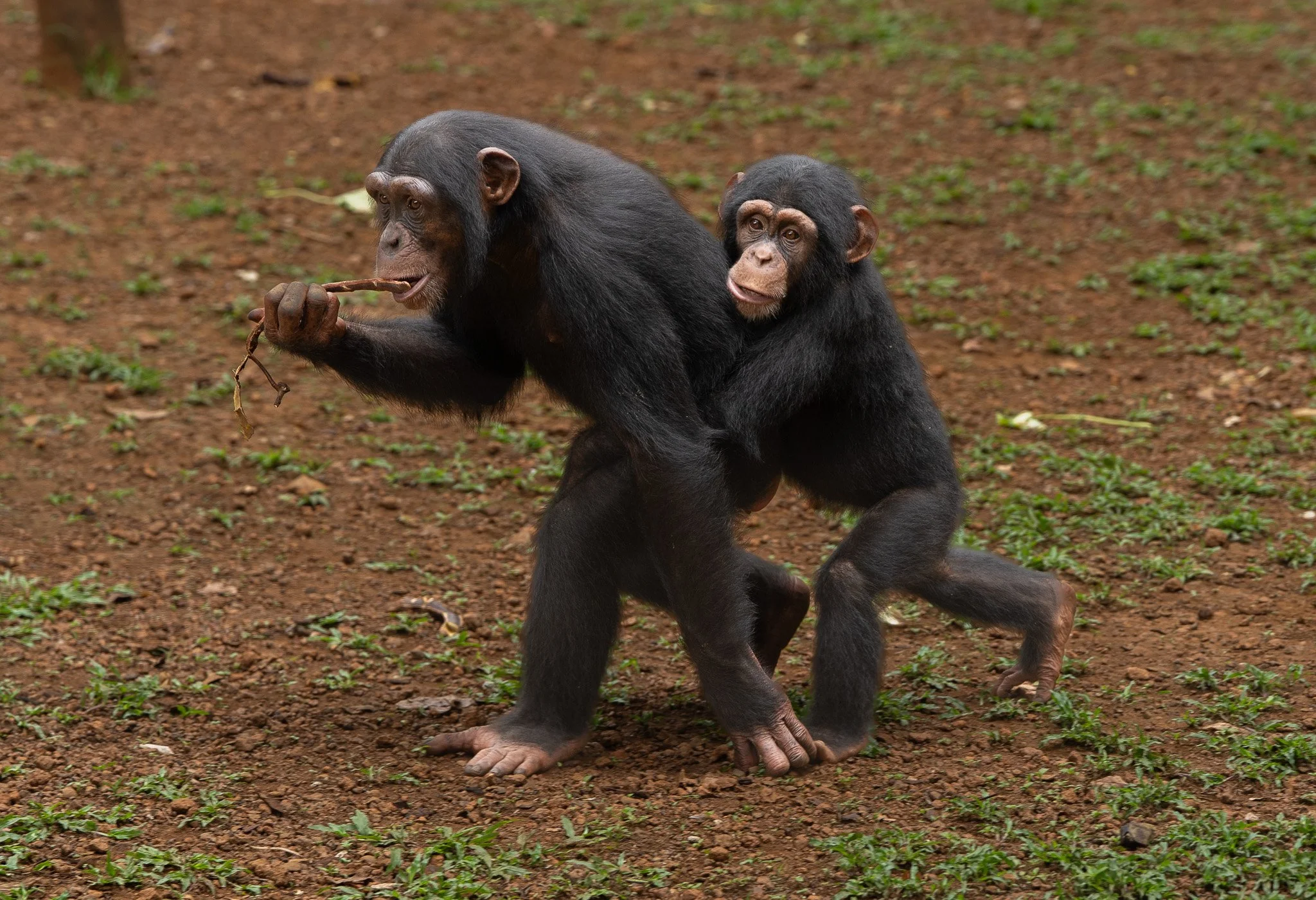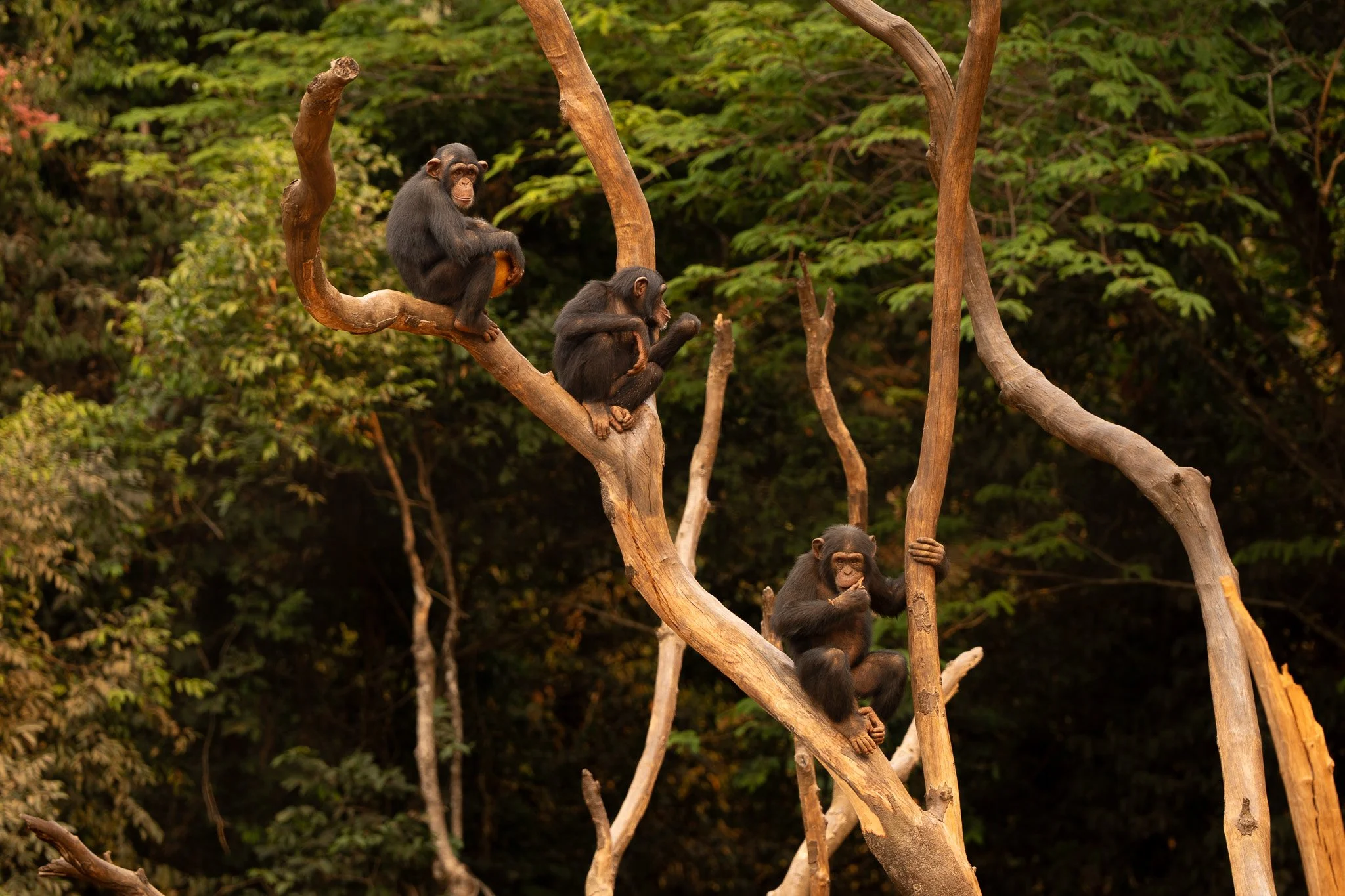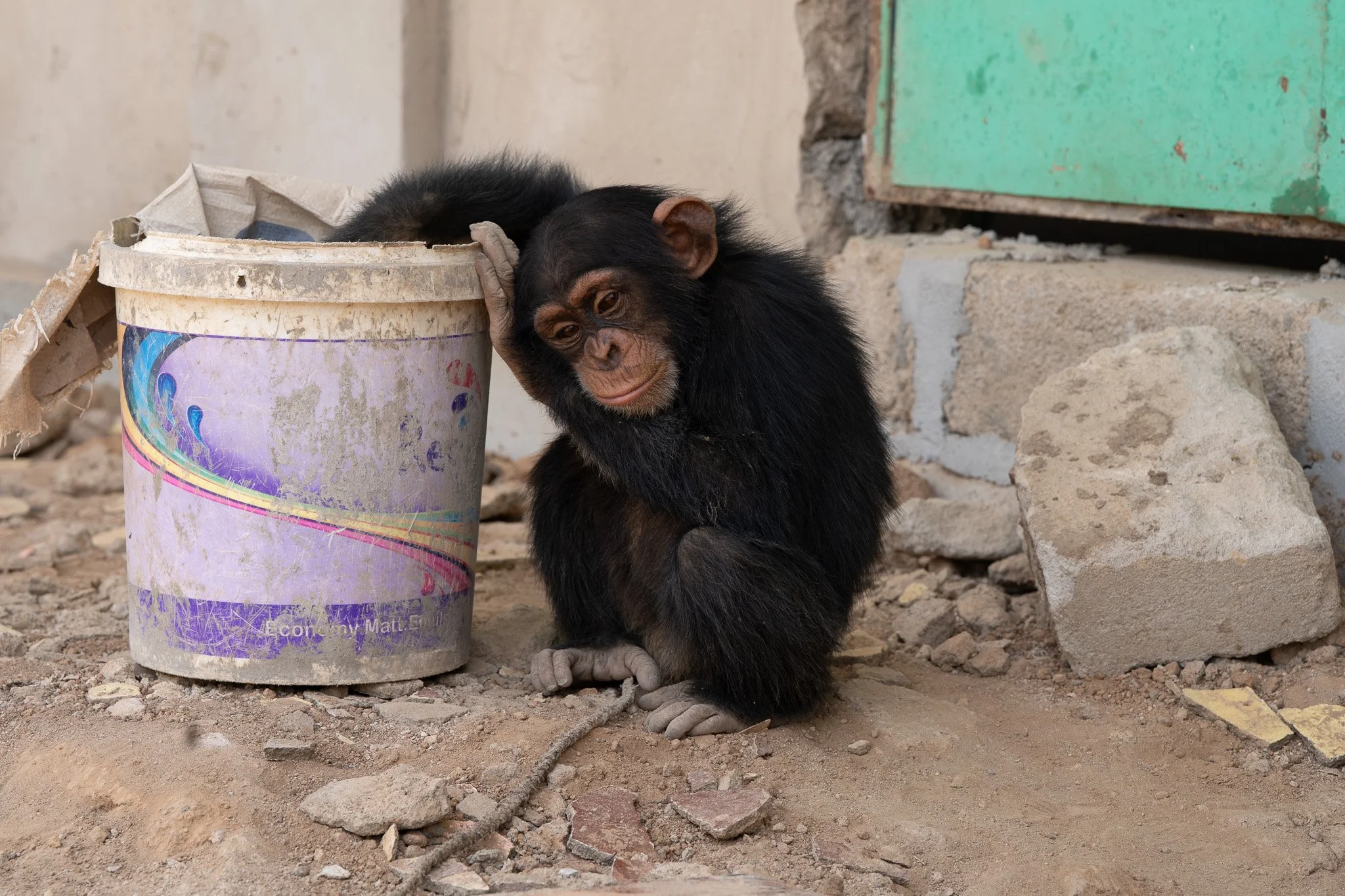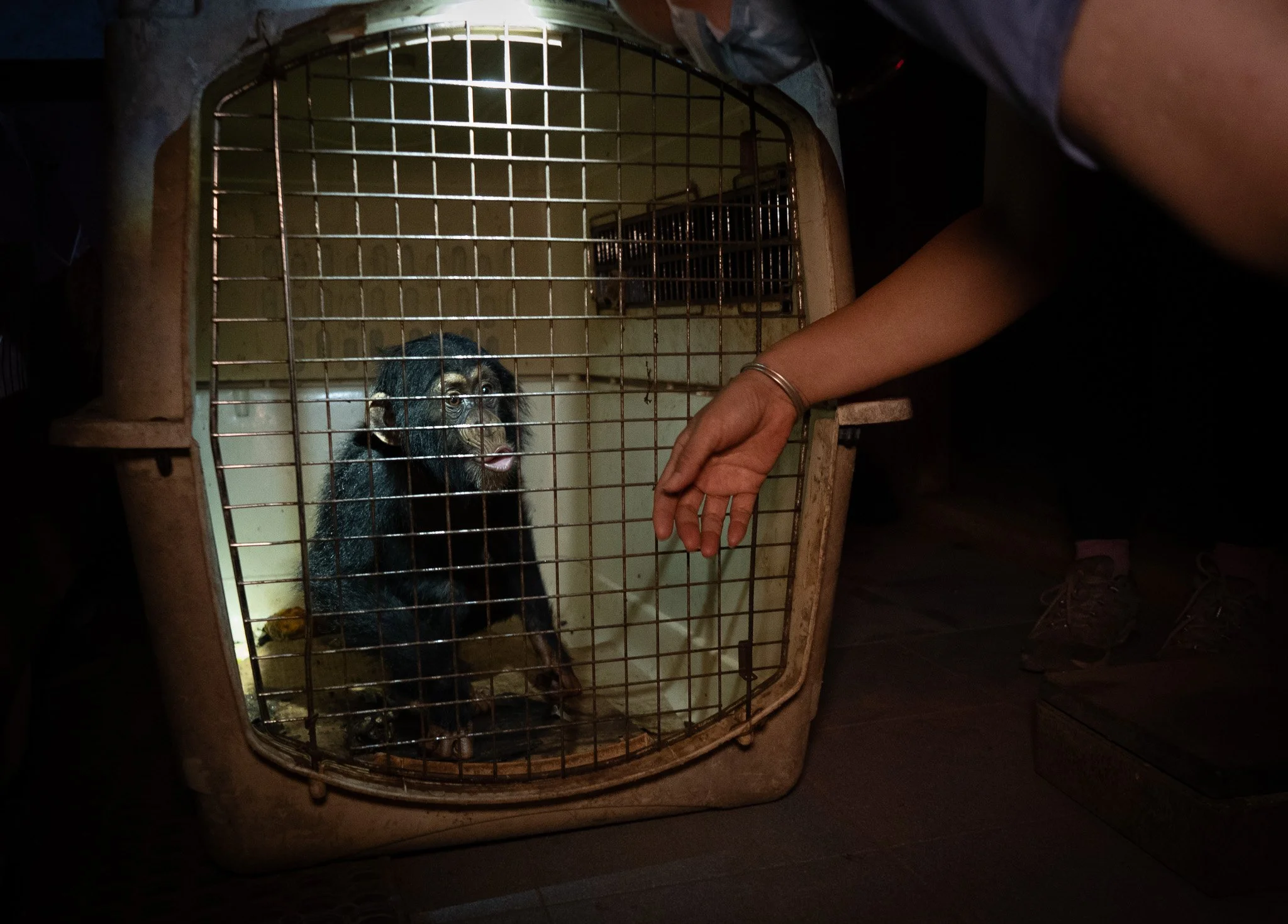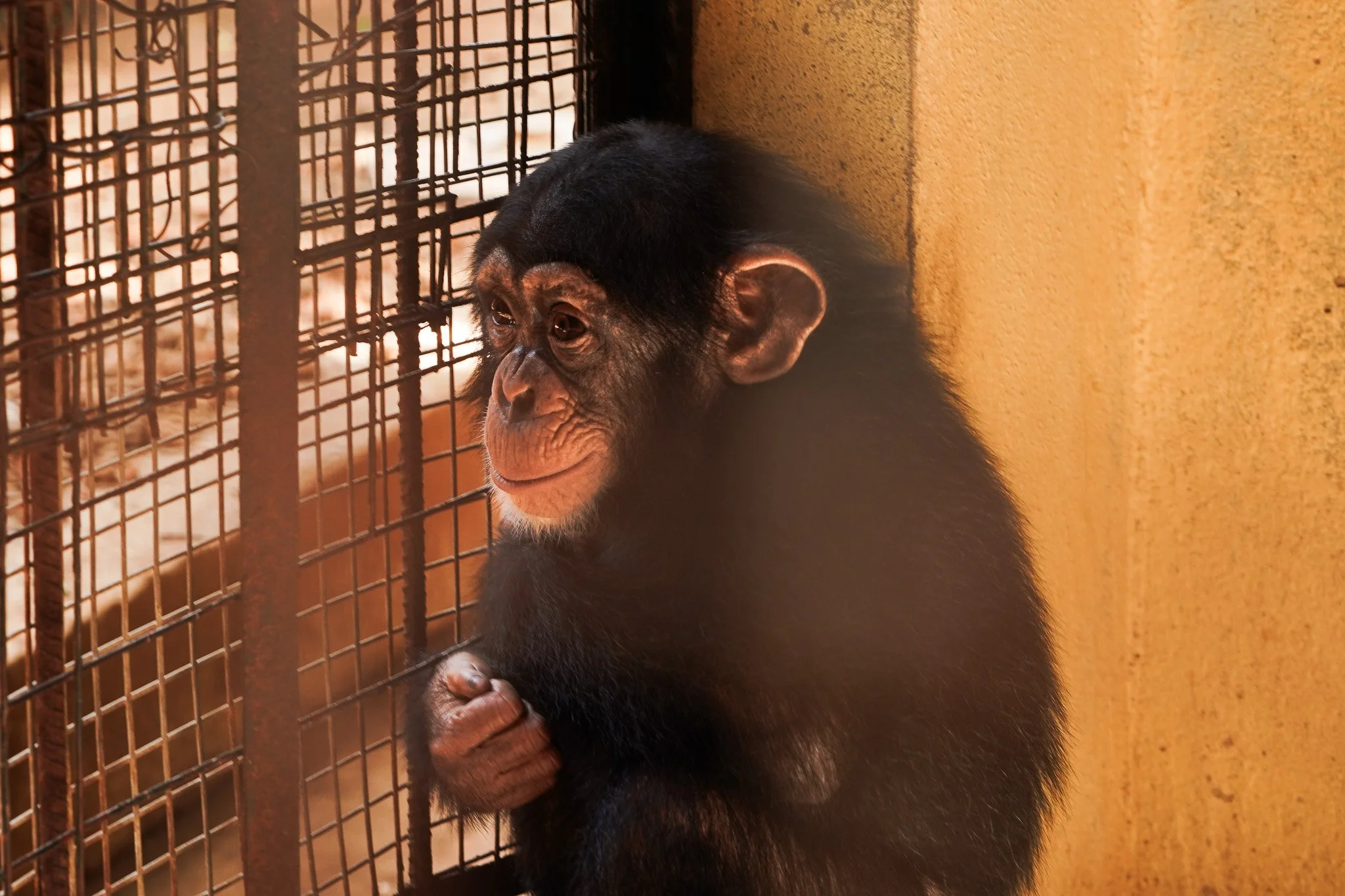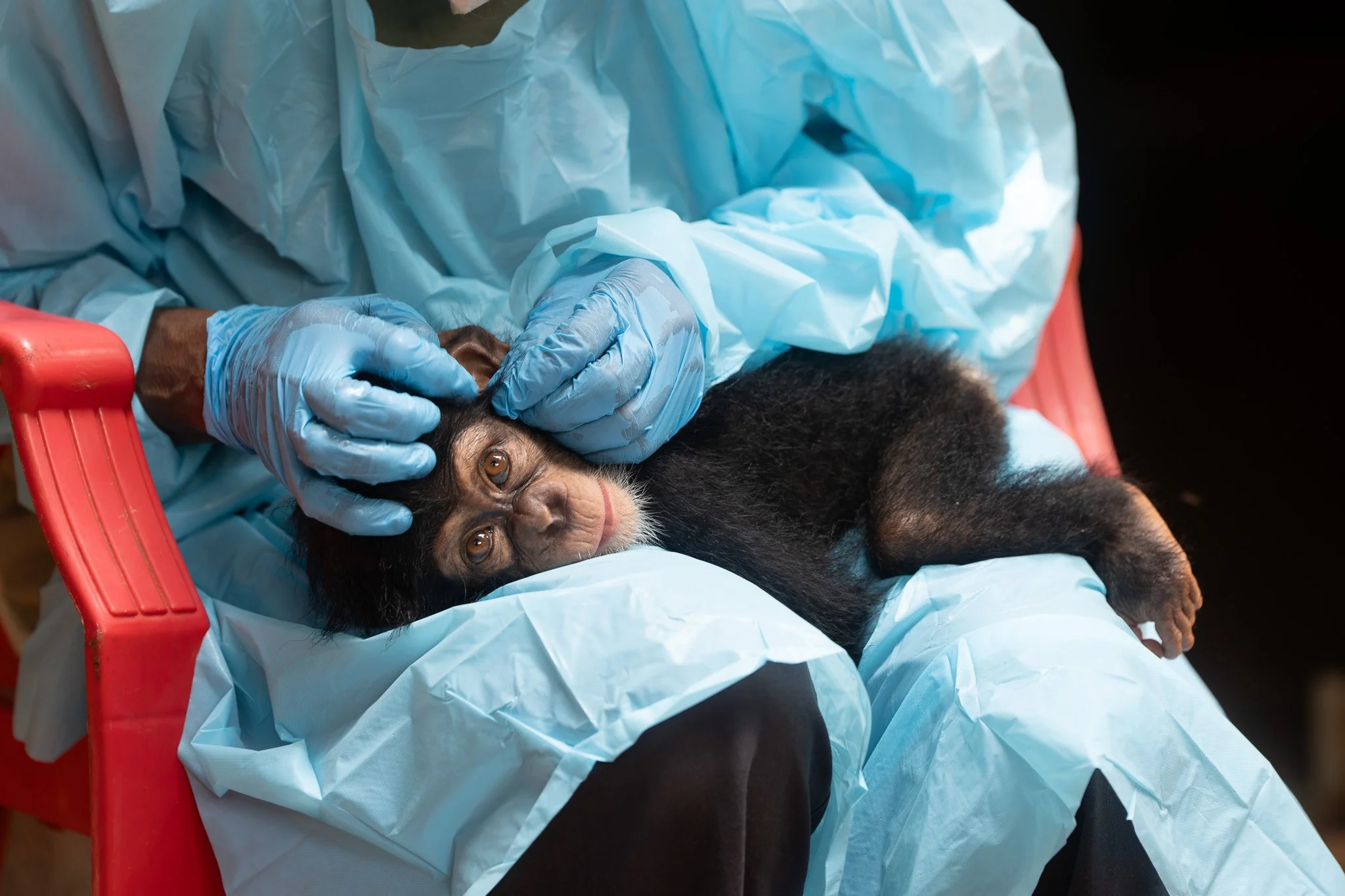Tacugama Chimpanzee Sanctuary in Freetown, Sierra Leone, is the country’s only wildlife sanctuary and home to more than 120 chimpanzees—ranging from infants to adults over 40 years old. Most of the chimps arrive as babies, rescued from the illegal pet trade, their family often killed for bush meat. Nearly every month, Tacugama undertakes strategically planned rescue missions, often sparked by tips or discoveries on social media.
Once a chimpanzee is identified, the team investigates and, with support from local authorities, attempts to retrieve the animal. These rescues are not without challenges: wildlife laws such as Sierra Leone’s 1972 Wildlife Act are poorly enforced, and many community members are unaware that keeping or harming chimps is illegal. Some resist handing over the animals, expecting payment in exchange. Instead, Tacugama emphasizes education and sensitization, engaging directly with communities to explain the law and the environmental importance of protecting these creatures.
A Second Chance for Chimpanzees
Koba’s story begins in Kabala, where he had been purchased in a nearby village that gave him his name. For weeks, he was kept tethered by a rope around his waist in a courtyard, a lonely existence for a young chimpanzee.
When Tacugama’s rescue team arrived, they stayed overnight to prepare for his relocation. But by morning, Koba had slipped free, darting into the streets. Word spread quickly, and soon a small crowd gathered as the frightened chimp sat stranded at the roadside.
By chance, Bala Amarasekeran—Tacugama’s founder and director—was nearby. Called to assist, he drove straight to the scene. Pulling up, Bala stepped out of his vehicle and approached with the calm patience born of decades working with chimpanzees. Inch by inch, he closed the distance, then reached out and secured Koba by the ears—a technique he had learned in his early days caring for chimps, one that prevents them from biting in panic.
With Koba safely in his grasp, Bala lifted him into the back of his Land Rover and shut the door. But the hardest part was far from over. Ahead lay a five-hour journey to Freetown—and a new life where Koba would have to learn how to trust again as he integrates into his new life.
Rescue Mission
When a new chimpanzee arrives at the sanctuary, it is often late at night after an exhausting day of travel. The veterinary team is the first to greet them, conducting an immediate health assessment before settling the animal into an isolated den. From there, a mandatory 90-day quarantine begins to prevent the spread of disease. During this time, orphaned babies are nurtured by a surrogate mother who provides round-the-clock attention until the young chimp is ready to be introduced to others.
For the young chimps, this is among the most difficult chapters of their journey. Torn from their families and wrenched out of the wild, they arrive frightened, disoriented, and surrounded by unfamiliar faces.
Like humans, chimpanzees are deeply social beings. They crave comfort, affection, and routine. In those first fragile months, it falls to their human caregivers to provide the love and stability they’ve lost.
Arrival at the Sanctuary
A young chimp arrives at the sanctuary, frightened but gently welcomed by animal welfare staff.
Koba peers out of his new den, where he will spend 90 days in quarantine before joining the other chimps in nursery group.
Baby Esther being lovingly groomed by her surrogate mother, affectionately known as ‘Mama P.
Quarantine is far from easy—it demands round-the-clock care, patience, and unwavering dedication. For Tacugama’s youngest arrivals, every day is guided by the careful hands of surrogate mothers Hawa Kamara and Possay Kamara, affectionately and famously known as “Mama P.”
The babies begin each day with formula milk, carefully prepared to meet their nutritional needs. But nourishment alone is not enough. Daily trips to the forest are essential, giving the young chimps space to explore, climb, and discover the joys of play—skills they would have learned from their mothers in the wild. Under the watchful eyes of their human caregivers, they begin to regain a sense of security, routine, and, most importantly, the social bonds that are critical to their development.
Quarantine may be a period of adjustment and healing, but with Mama P and Hawa guiding them, the young chimps slowly start to thrive in their new world.
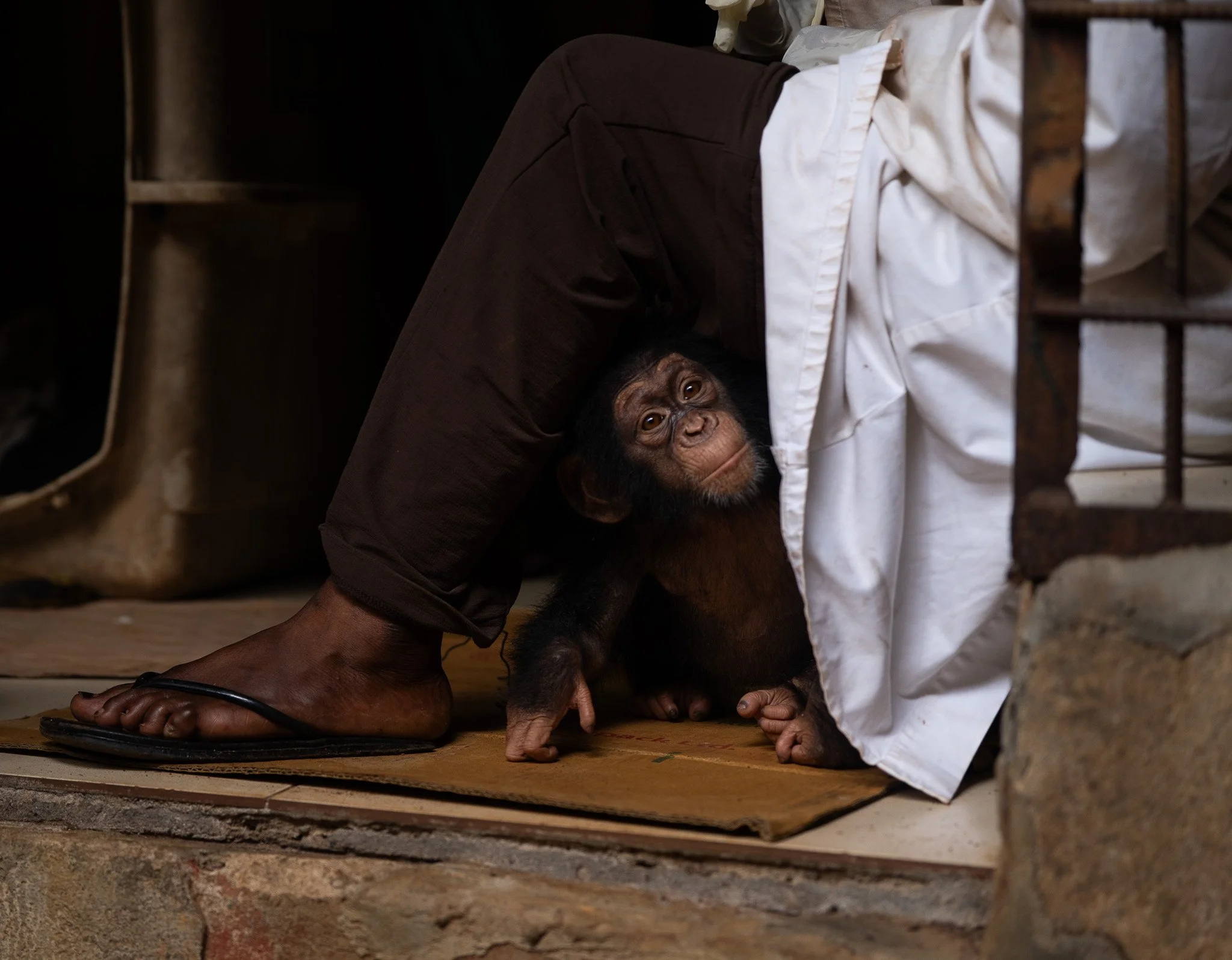

Still clinging to her surrogate mother, a young chimp struggles to adjust after the trauma of being torn from the wild — a reminder of the long road to recovery faced by many rescues.

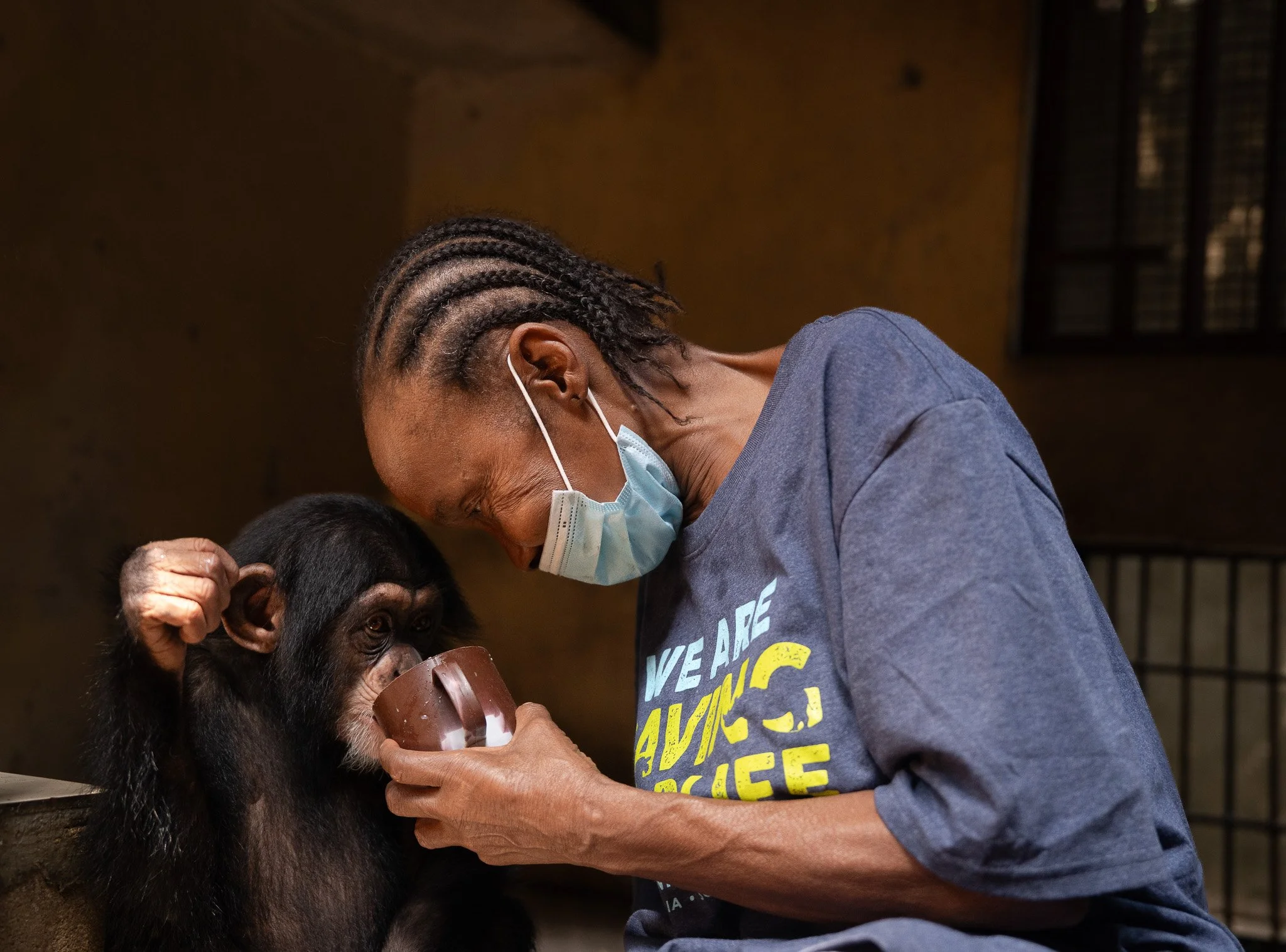
Mama P lovingly giving some formula milk to Asana, a recently rescued young chimp.

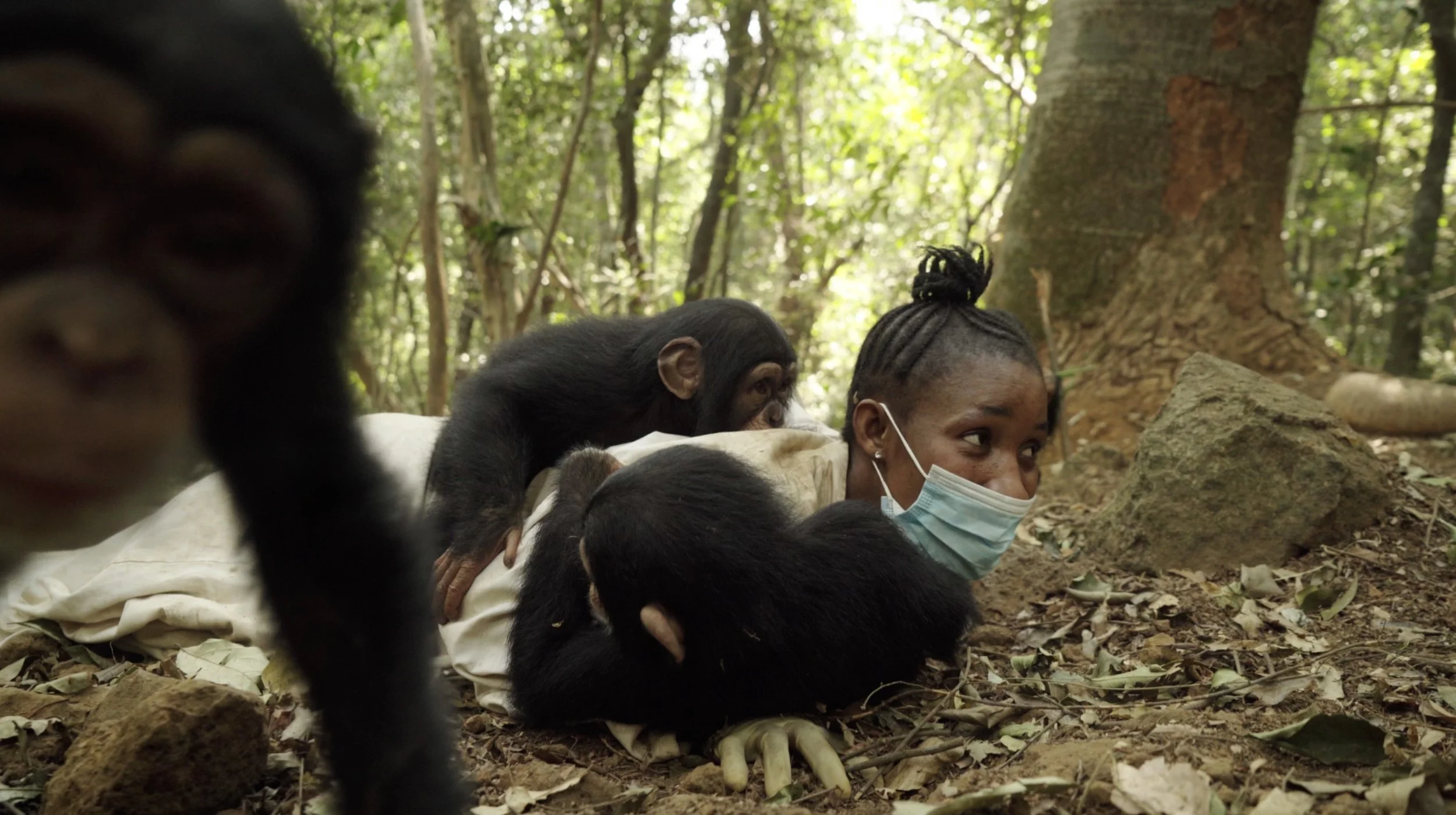
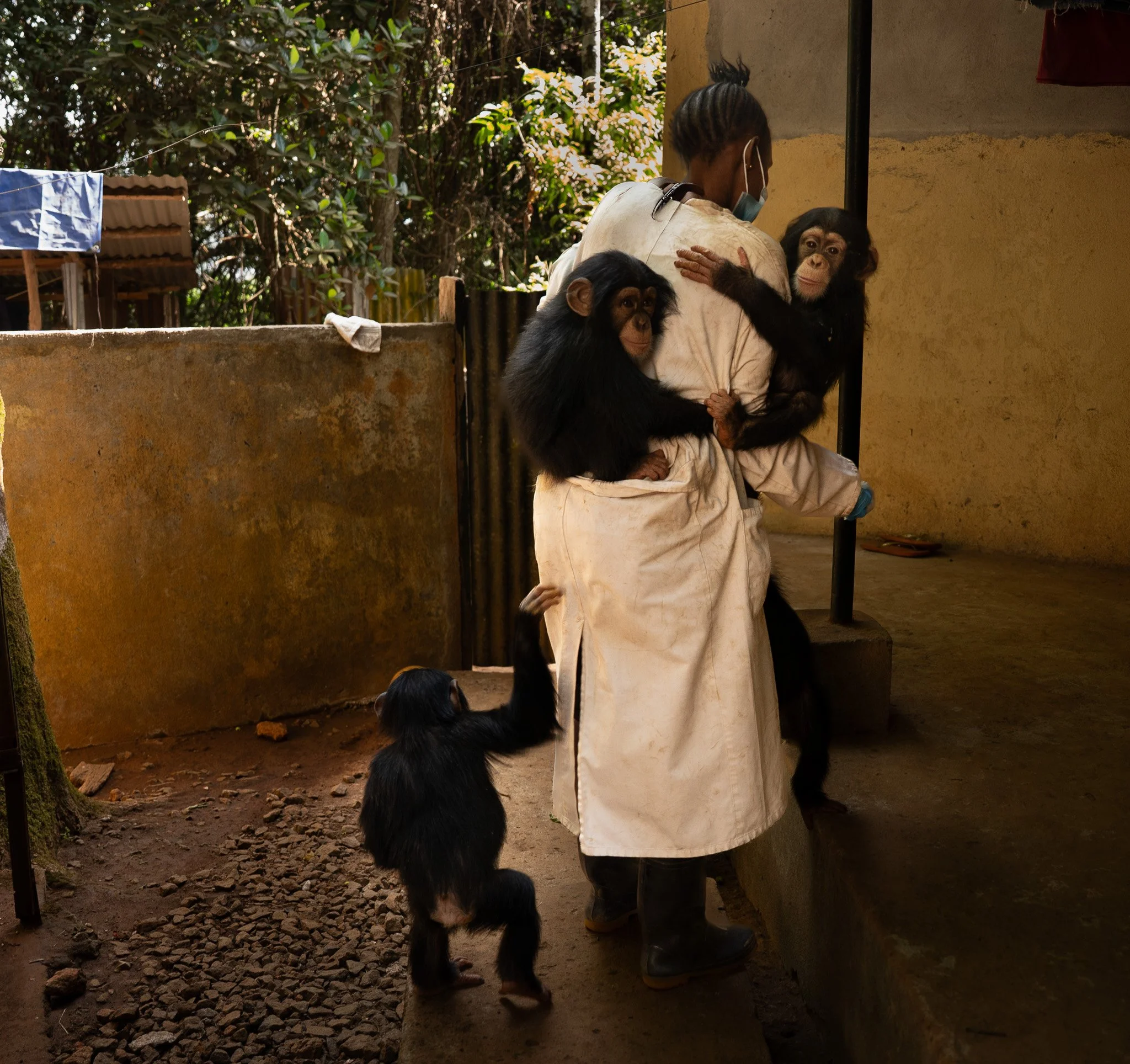
Animal care staffer and surrogate mother Hawa Kamara takes the young chimps to the forest to play and learn to climb.
From Rescue to Recovery:
Lifesaving Health Checks for Chimpanzees
Every rescued chimpanzee undergoes a thorough medical examination on arrival, followed by annual health checks for all residents. These assessments, essential to monitor growth and detect illness, are no small undertaking for Tacugama’s limited veterinary team and local caregivers. Each procedure requires the animals to be anesthetized, making the process both delicate and meticulously coordinated.
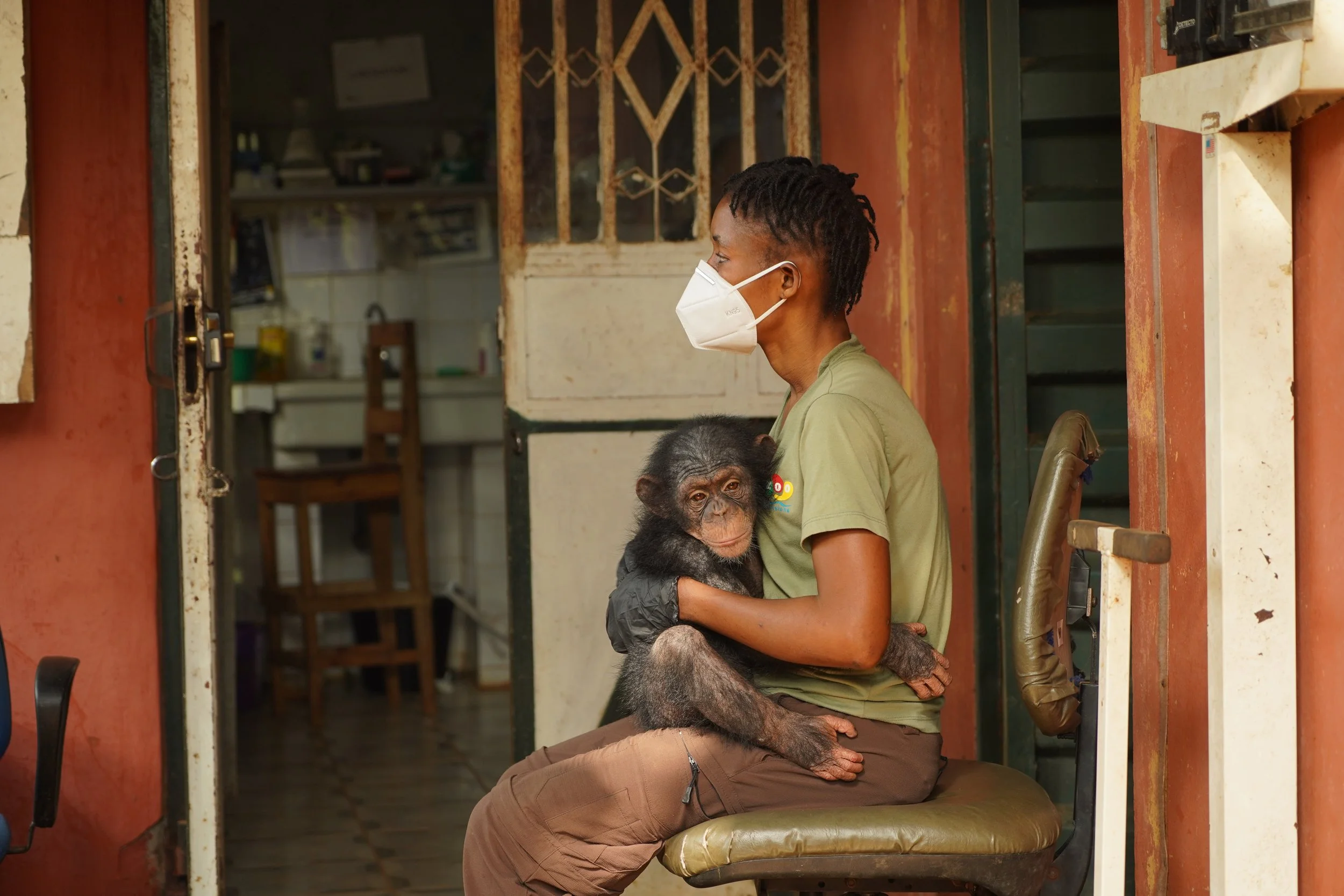
Hawa cradles young Minnie Winnie as the anesthesia begins to take effect ahead of her health check.
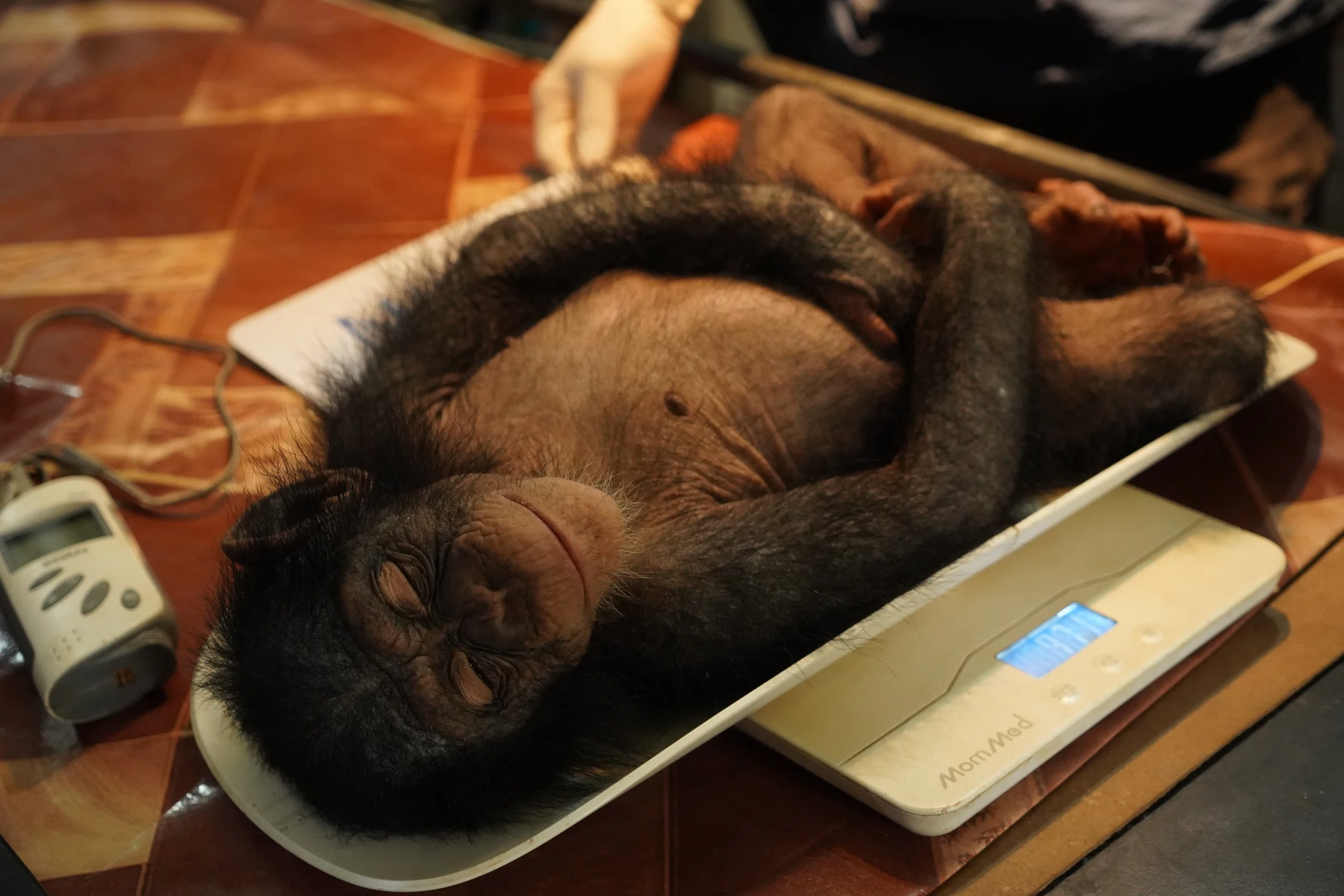
Minnie Winnie getting weighed on a scale.
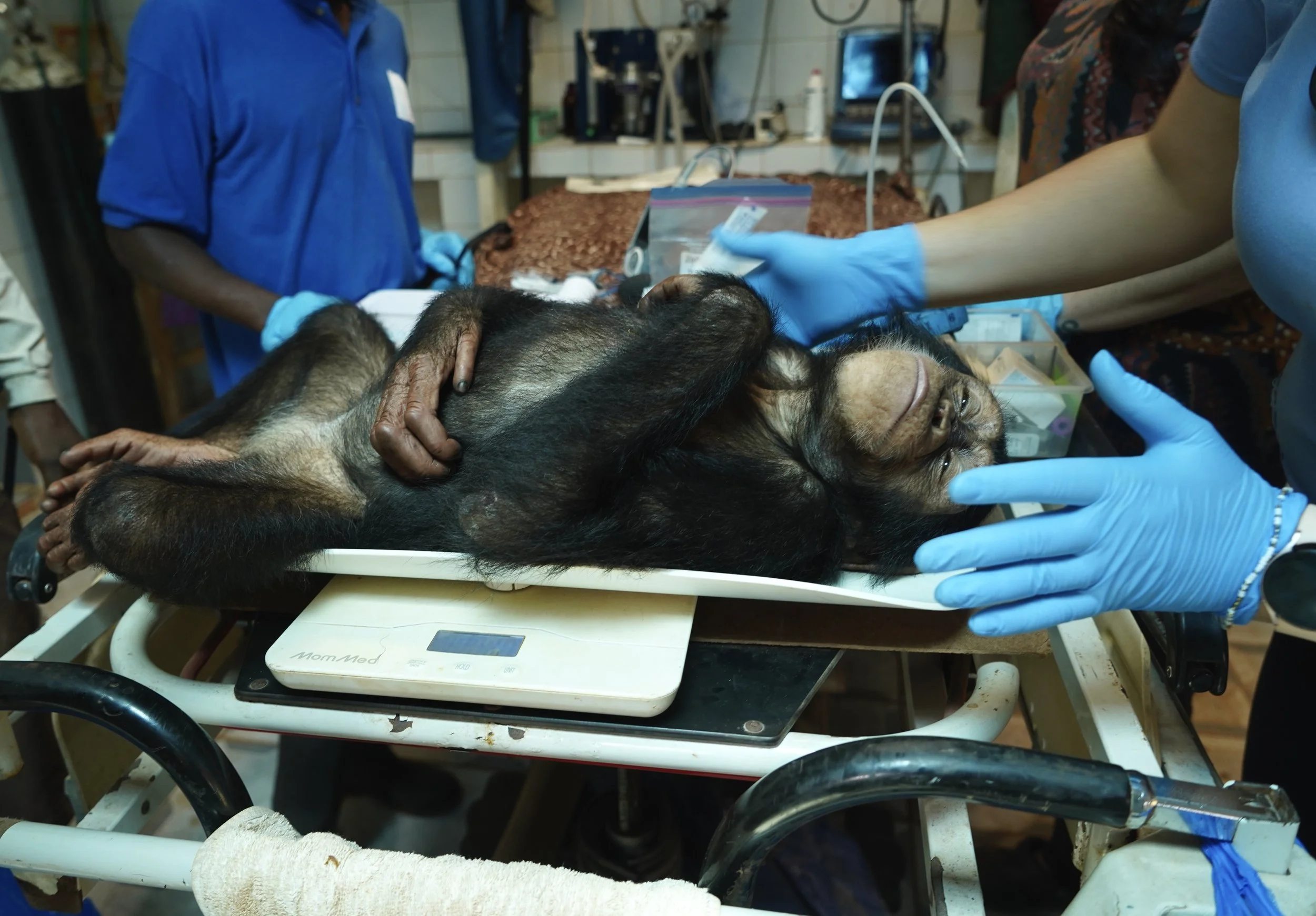

Vets examine each chimpanzee’s teeth—not only to spot cavities or injuries, but also to assess age, diet, and overall health.
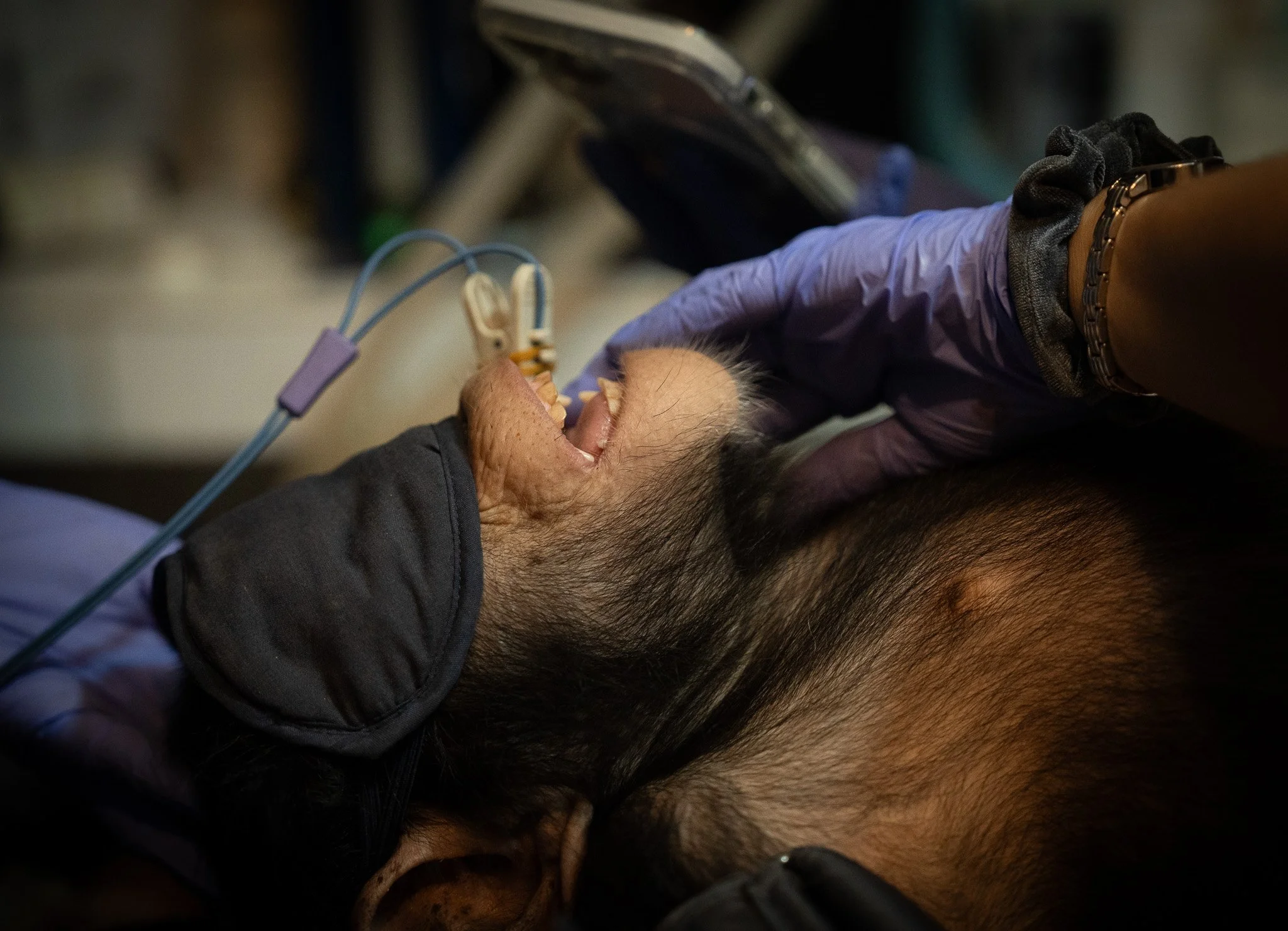
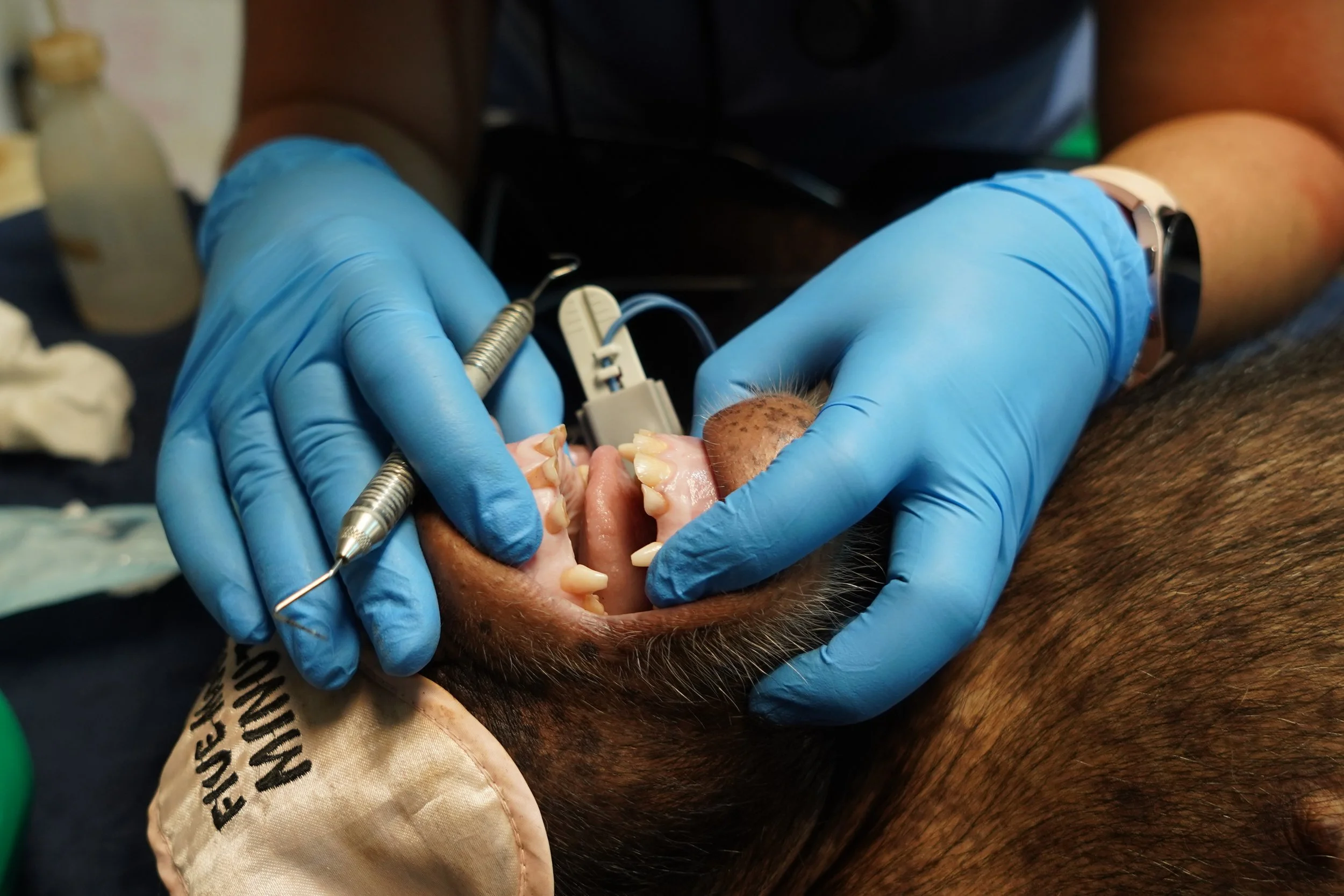
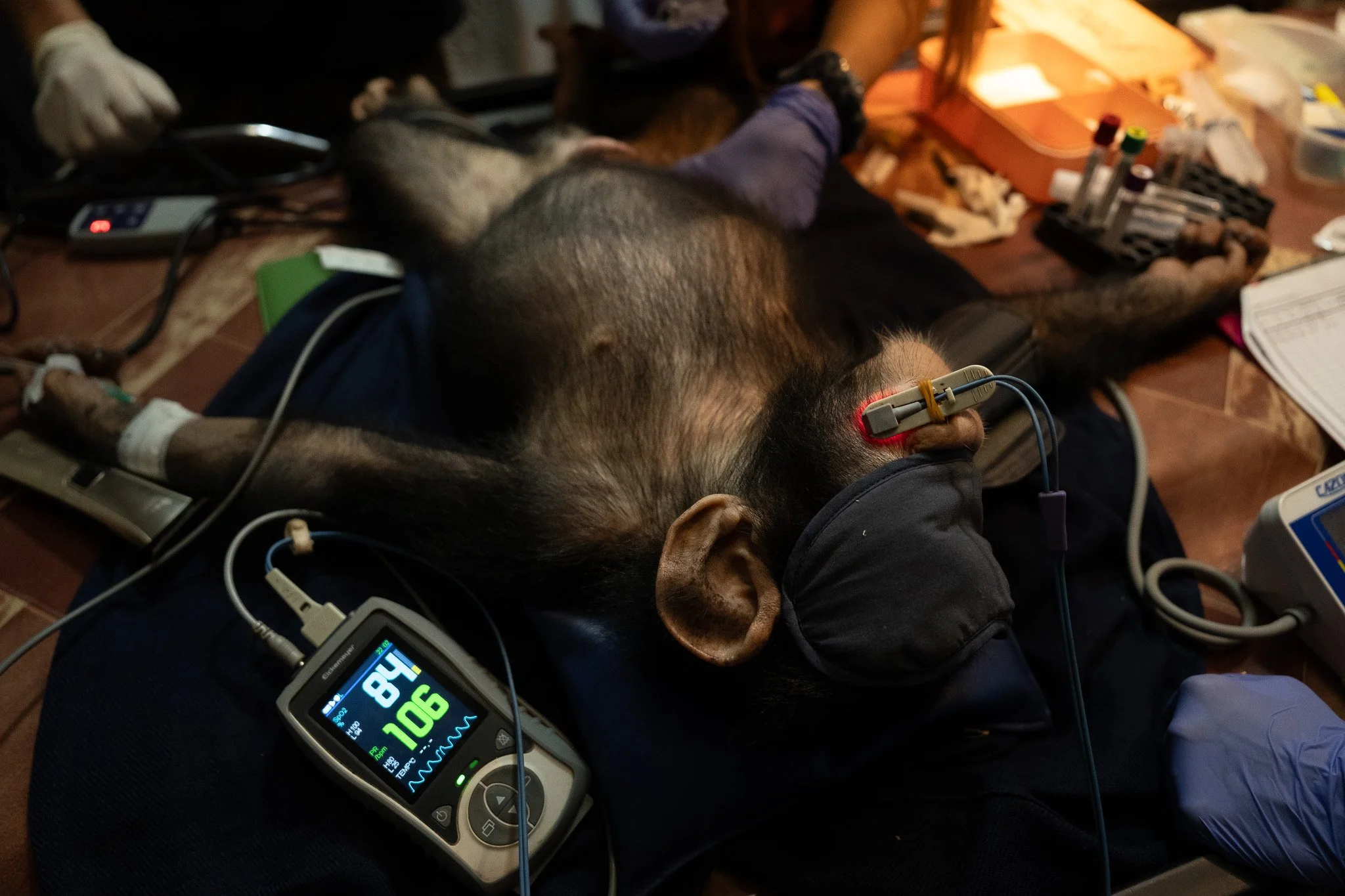
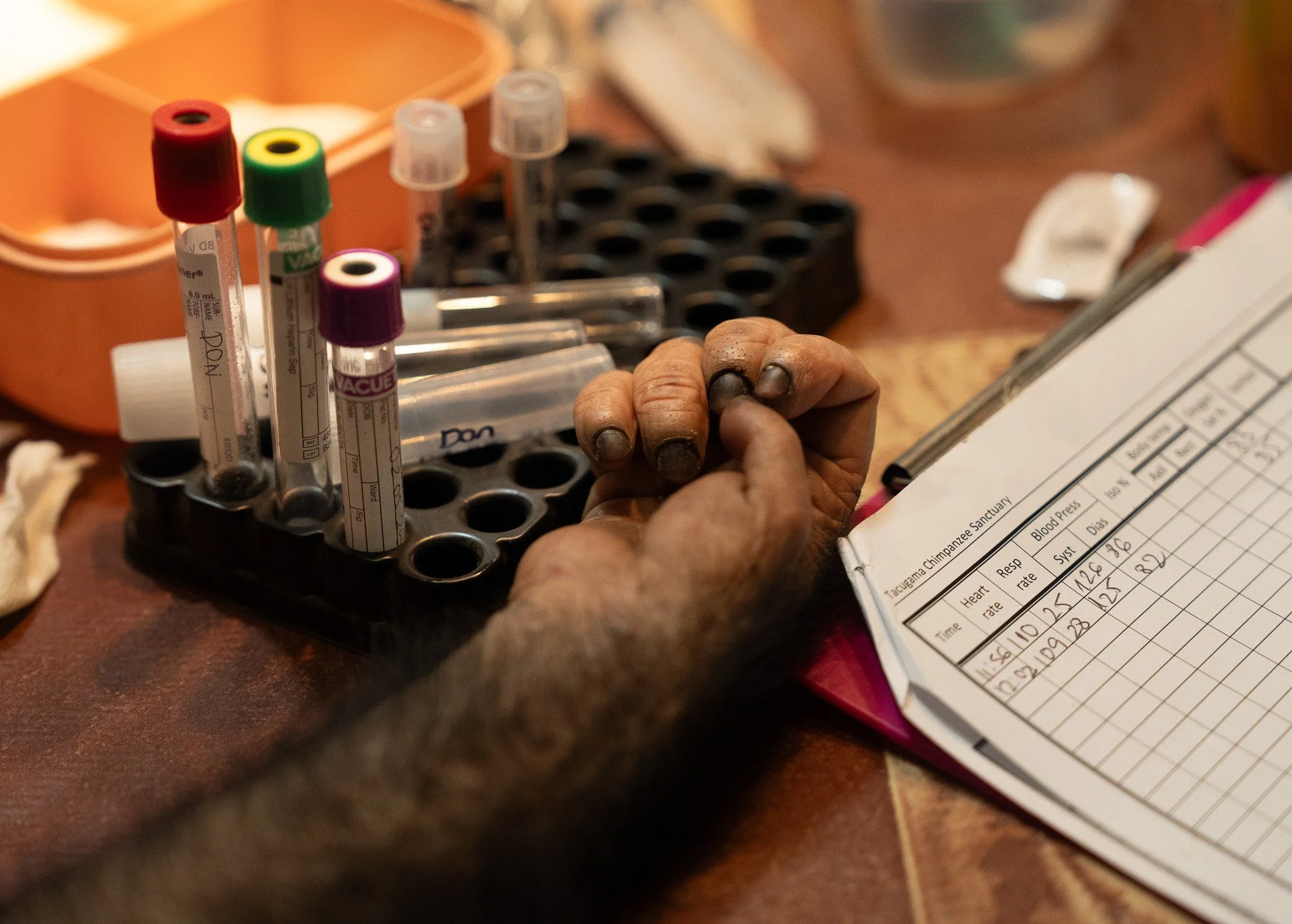
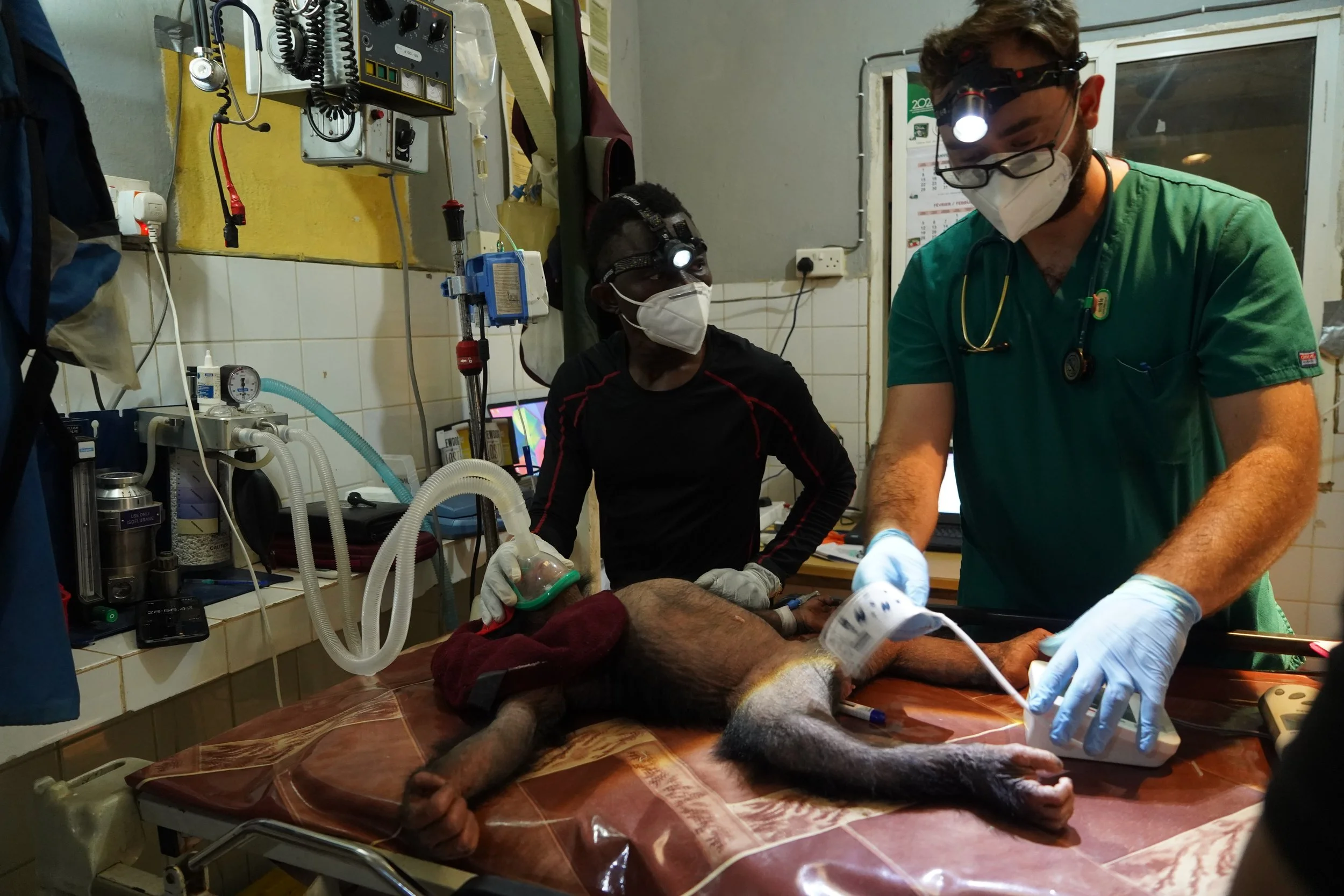
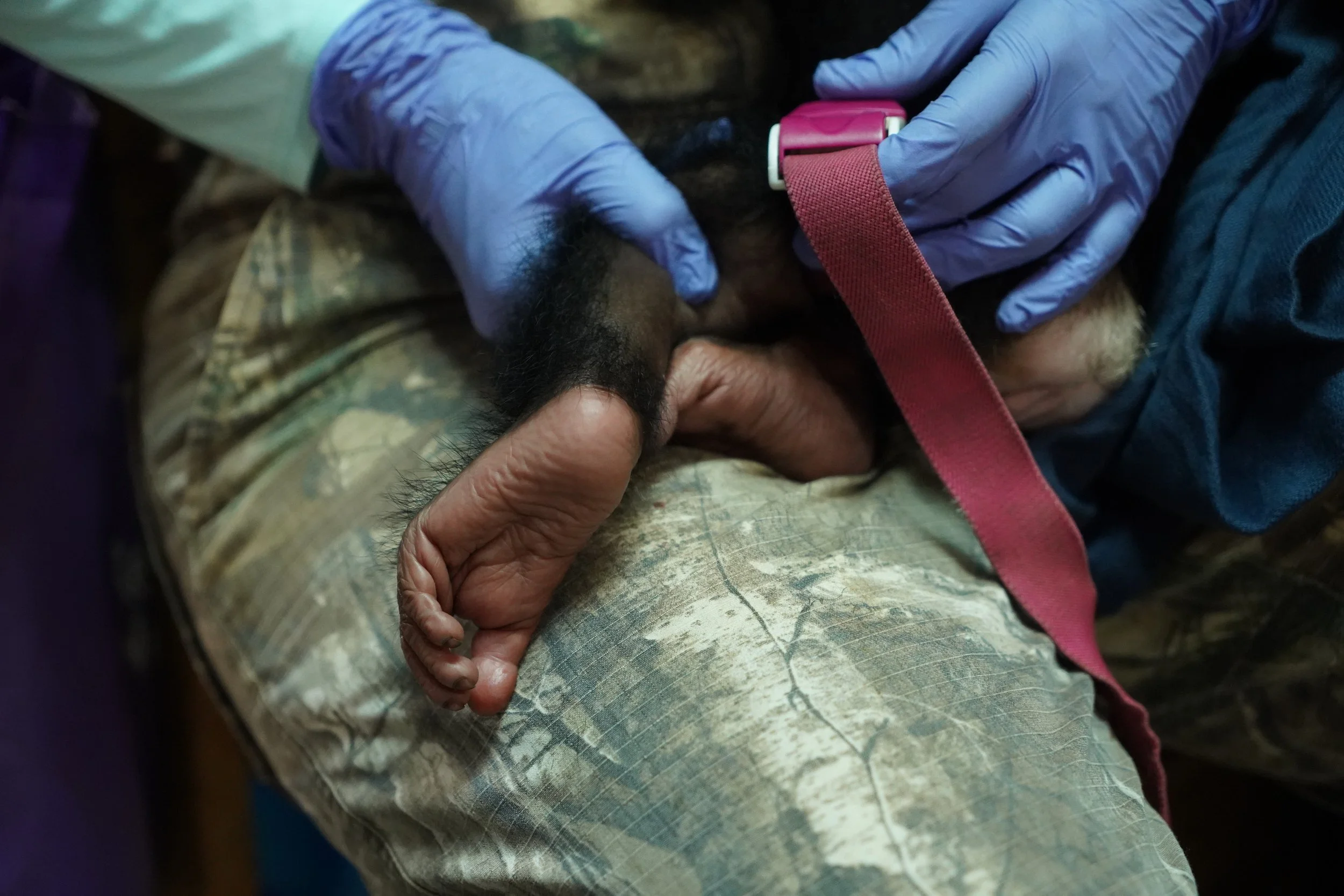
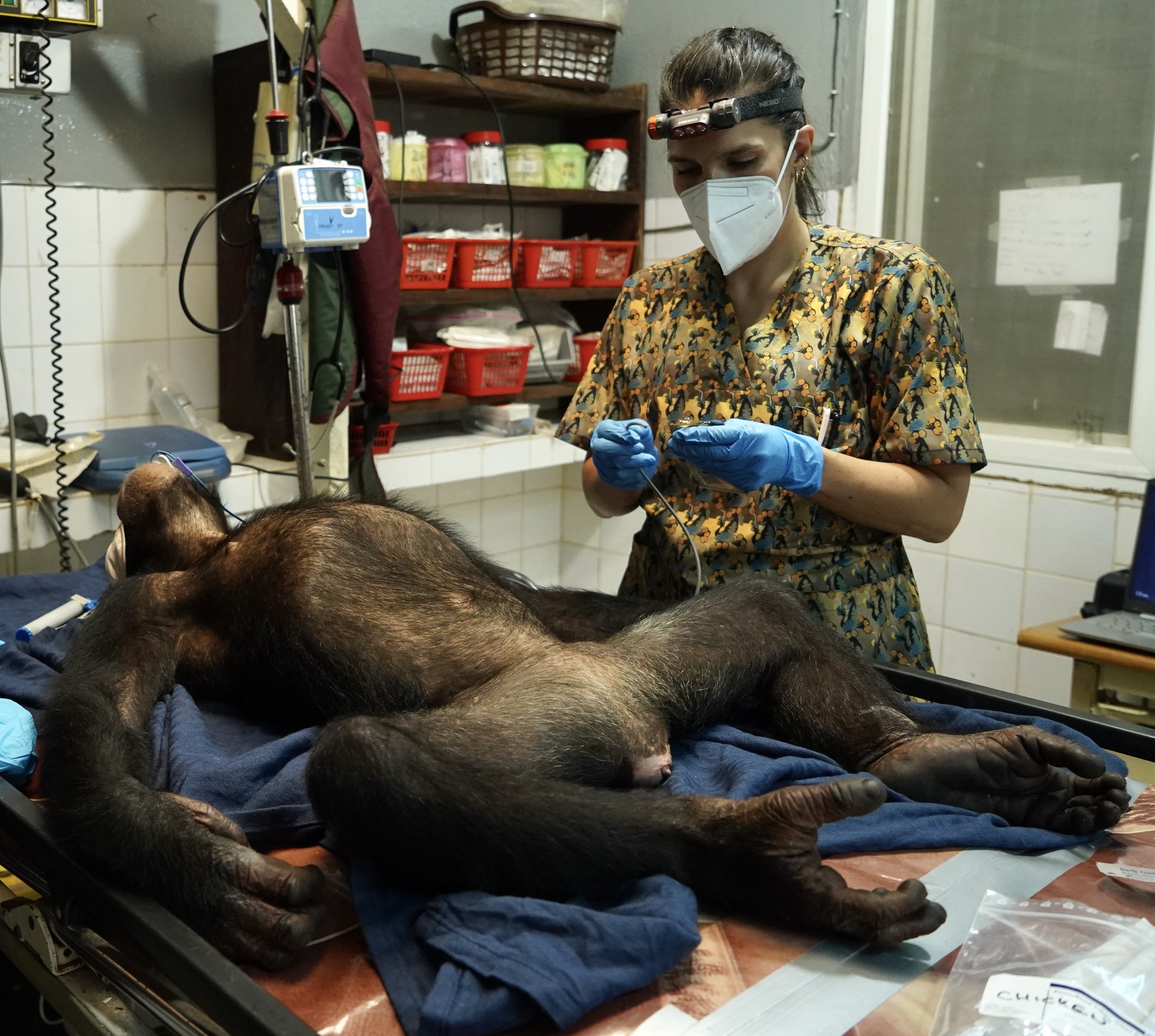
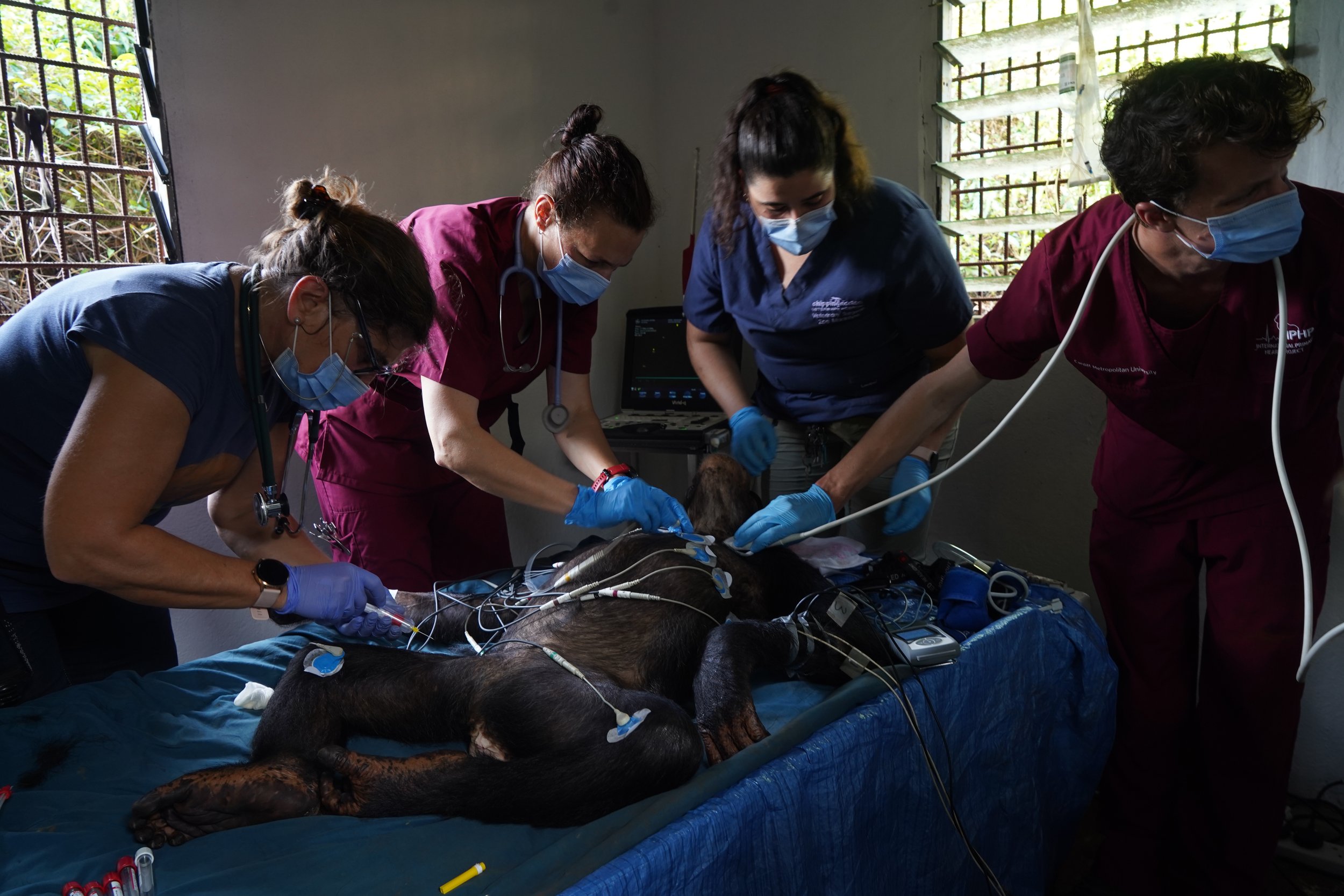
In 2024, an international team of specialists arrived to help conduct annual health checks and gather data for global research. The team included a nutritionist, reproductive experts, lab researchers from the University of Manitoba, a cardiologist from the International Ape Heart Project, and a leading chimpanzee expert.
Failure on the Frontlines:
How Enforcement Gaps Endanger Chimps
Not every chimpanzee rescue ends in success. In 2024, a team was dispatched to Koidu, in Kono district in Sierra Leone’s Eastern Province after repeated reports of a young chimpanzee being kept illegally. Local law enforcement, however, failed to back the sanctuary team when the family refused to hand the animal over.
Months later, with support from the Ministry of Environment and Climate Change’s Forest Division, the team returned. By then it was too late. Instead of a frightened chimp in need of care, they found only bones—still bearing flesh—simmering in a pot of stew.
No legal consequences followed for the community involved, despite the clear violation of wildlife law. It was a grim reminder that without proper enforcement, crimes against endangered species will continue unchecked. The team nevertheless confiscated the bones as evidence and tried to pursue legal action.
Chimpanzees at Tacugama cannot currently be released into the wild because Sierra Leone’s forested landscapes are shrinking fast and where there is enough space, other wild chimp groups already occupy and introducing new chimps could create violent rivalrly. According to the World Food Programme’s (WFP) latest report, the Western Area Peninsula National Park alone lost about 715 hectares of forest in 2024—equivalent to over 1,300 football fields. Cumulatively, the park has lost roughly 5,600 hectares, or one-third of its forest cover since monitoring began. Illegal encroachment, uncontrolled fires, quarries, and land-grabbing for housing are driving the destruction.
Given these pressures, Tacugama’s chimps cannot be returned safely to truly wild forest now. But that doesn’t mean their lives are devoid of progress. After spending early weeks or months in the nursery enclosure, young chimps are moved into a “play and learn” enclosure—where they have far more opportunity to climb, explore, interact with peers, and build strength. When ready, they eventually transition into larger forested enclosures shared with other chimp groups. These spaces are designed to allow chimpanzees to forage, climb trees, swing, and live as close to their wild instincts as possible.
The integration process is delicate. Chimpanzees have complex social structures, with hierarchies, alliances, conflicts—much like human societies—and tensions can arise when individuals are introduced to new groups. The Tacugama team monitors every step, making sure that social dynamics, health, and behavior are carefully managed to reduce stress, injuries, or social rejection.
There are still enormous challenges ahead for conservation in Sierra Leone. Each chimp that arrives at Tacugama is a living reminder of habitat loss and human impact. Yet through community outreach, alternative livelihood programs, and sustainable land-use efforts in the very places where chimps are rescued, Tacugama is striving to turn that reminder into something more: a path toward restoration, awareness, and hope.

